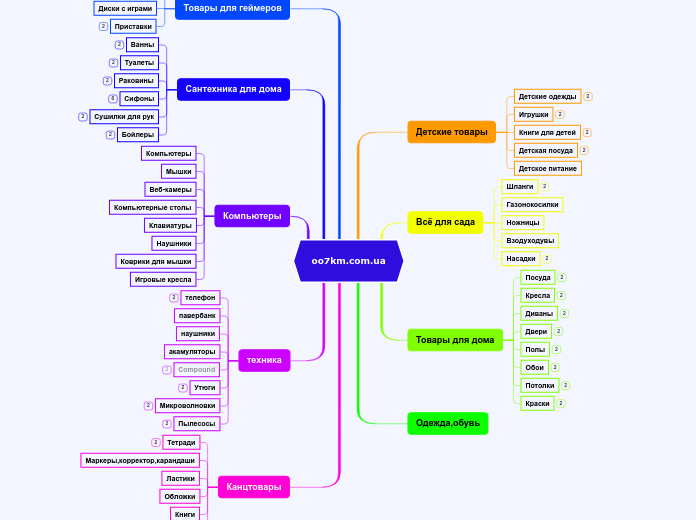av Никита Гаркуша för 4 årar sedan
253
oo7km.com.ua
A comprehensive online store offers a wide array of products catering to various needs. Shoppers can find an extensive selection of stationery items, including markers, erasers, and notebooks.

av Никита Гаркуша för 4 årar sedan
253

Mer av detta
The part of speech is a category to which a word is assigned according to its syntactic functions. In English the main parts of speech are noun, pronoun, adjective, determiner, verb, adverb, preposition, conjunction, and interjection.
A conjunction is a word like 'if' 'but' or 'and' which is used to connect sentences or clauses together.
Subordinating conjunctions are conjunctions that are used at the beginning of subordinate clauses. Some examples of these conjunctions are: although, after, before, because, how, if, once, since, so that, until, unless, when etc.
Coordinating conjunctions always connect phrases, words, and clauses. They are: for, and, nor, but, or, yet, so.
A preposition is one of the most exciting parts of grammar. A preposition is used to describe the location of something in relation to something else.
A group of words used with the force of a single preposition is called phrase preposition.
Participle preposition consists of words that end in “ing”.
When a preposition consists of more than one word, it is called double preposition.
Compound preposition consists of two or more words.
When a preposition consists of one word it is called single or simple preposition.
An interjection is used to express emotion in a sentence.
Think of other interjections!
An adverb is used to describe a verb, but it can also describe an adjective or another adverb.
Adverbs normally help paint a fuller picture by describing how something happens.
The intensifiers strengthen adverbs adjectives and adverbs and down- toners make them weaker.
Fairly, Rather
Extremely, Very
A numeral is a word or phrase that describes a numerical quantity.
Some theories of grammar use the word 'numeral' to refer to cardinal numbers that act as a determiner to specify the quantity of a noun, for example the 'two' in 'two hats'.
An article is a word used to modify a noun, which is a person, place, object, or idea. Technically, an article is an adjective, which is any word that modifies a noun.
A pronoun is a word that can be used in place of a noun, typically after the noun itself has already been stated.
Unlike demonstrative pronouns, which point out specific items, indefinite pronouns are used for non-specific things. This is the largest group of pronouns. All, some, any, several, anyone, nobody, each, both, few, either, none, one, and no one are the most common.
Relative pronouns are used to add more information to a sentence. Which, that, who (including whom and whose), and where are all relative pronouns.
Interrogative pronouns are used in questions. Although they are classified as pronouns, it is not easy to see how they replace nouns. Who, which, what, where, and how are all interrogative pronouns.
Reciprocal pronouns are used for actions or feelings that are reciprocated. The reciprocal pronouns are each other and one another.
A reflexive pronoun ends with ...self or ...selves and refers to another noun or pronoun in the sentence (usually the subject of the sentence). The reflexive pronouns are myself, yourself, herself, himself, itself, ourselves, yourselves, and themselves.
Demonstrative pronouns are used to demonstrate (or indicate). This, that, these, and those are all demonstrative pronouns.
Possessive pronouns are used to show possession. The possessive pronouns are mine, yours, his, hers, ours, and theirs.
The personal pronouns are I, you, he, she, it, we, they. More often than not (but certainly not always), they replace nouns representing people.
An adjective is a word that's used to describe a specific noun and to provide more detail to the listener.
Superlative adjectives demonstrate a higher level of comparison between entities.
Expresses a comparison between two entities or groups of entities in quality or degree.
A verb is an action word or 'doing' word that signifies movement in some way.
An auxiliary verb helps the main (full) verb and is also called a 'helping verb.' With auxiliary verbs, you can write sentences in different tenses, moods, or voices.
A participle is a verb form that can be used as an adjective or to create a verb tense. There are two types of participles: Present participle (ending -ing) and Past participle (usually ending -ed, -d, -t, -en, or -n).
A modal is a type of auxiliary (helping) verb that is used to express: ability, possibility, permission or obligation. The main modal verbs in the English language are: can, could, may, might, must, shall, should, will, would.
A linking verb connects the subject with a word that gives information about the subject, such as a condition or relationship.
A verb with its own meaning: a verb that is not an auxiliary verb.